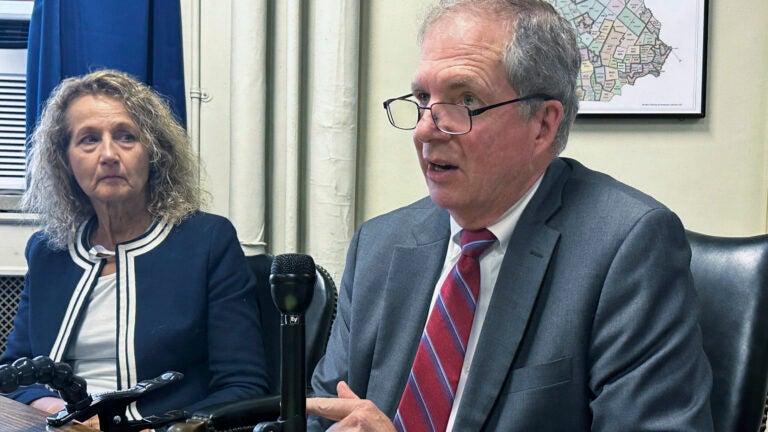New Hampshire secretary of state won’t block Trump from ballot in key presidential primary state
Politics
Under New Hampshire law, the name of anyone who pays the filing fee and swears they meet the age, citizenship and residency requirements “shall be printed on the ballots.”

CONCORD, N.H. (AP) — New Hampshire’s top election official said Wednesday he will not invoke an amendment to the U.S. Constitution to block former President Donald Trump from appearing on ballots in the state, which will hold the first Republican presidential primary next year.
“As long as he submits his declaration of candidacy and signs it under the penalties of perjury and pays the $1,000 filing fee, his name will appear on the presidential primary ballot,” Secretary of State David Scanlan said in a press conference he called to address various legal efforts to bar Trump from the 2024 race.
Under New Hampshire law, the name of anyone who pays the filing fee and swears they meet the age, citizenship and residency requirements “shall be printed on the ballots.”
“That language is not discretionary,” said Scanlan, a Republican elected by the Legislature with bipartisan support in 2022 after serving two decades as deputy secretary of state.
Scanlan rejected claims made in lawsuits filed in New Hampshire and elsewhere that Trump is ineligible to run for the White House again under a rarely used clause under the 14th Amendment to the U.S. Constitution, which prohibits those who “engaged in an insurrection or rebellion” against the Constitution from holding higher office. While other election officials have said they are looking for guidance from the courts on how to interpret the clause, Scanlan said it doesn’t pertain to running for office.
“In a situation where some states permit a name to appear on the ballot and other states disqualify it, chaos, confusion, anger and frustration will be the result,” he said. “At a time when we need to ensure transparency and build confidence among voters around the country, the delegate selection process should not be the battleground to test this constitutional question.”
The Civil War-era clause prohibits anyone who swore an oath to uphold the Constitution — and then broke it — from holding office. The provision is nestled at the end of the 14th Amendment, which has been the foundation of civil rights litigation, and doesn’t explicitly mention the presidency but does cite “presidential electors.”
It has been used only a couple of times since Congress rescinded the measure’s ban on former Confederates in 1872. But the clause received renewed attention after the Jan. 6, 2021, attack on the U.S. Capitol by supporters of Trump who were seeking to halt certification of the 2020 election results.
The liberal group Free Speech For People, which sued to bar Trump from the ballot in Minnesota on Tuesday, asked in 2021 that all 50 states keep the former president off the 2024 ballot. Those demands have drawn more attention as voting in the Republican presidential primary draws nearer and an increasing number of legal scholars argue that the 14th Amendment may actually prohibit Trump from running again.
Scattered lawsuits have been filed making that claim, usually by relatively obscure political personalities representing themselves, such as in Maine and New Hampshire. In both states, a longshot Republican presidential hopeful who lives in Texas has filed the lawsuit. But the first wave of significant litigation began last week when a prominent liberal group sued to keep the former president off the Colorado ballot. The Trump campaign briefly moved the case from Colorado court to federal court, but on Tuesday it returned to state court.
The issue will likely only be resolved by the U.S. Supreme Court, which has never ruled on the clause.
Most Secretaries of State have balked at the idea of striking a presidential candidate on their own. Minnesota Secretary of State Scott Simon, a Democrat, said in a statement last week that his office can’t take such action on its own and could only do so if compelled by courts.
“The Office of the Minnesota Secretary of State does not have legal authority to investigate a candidate’s eligibility for office,” Simon said days before the lawsuit filed by Free Speech For People to declare Trump ineligible.
Scanlan’s announcement, backed up by a legal analysis from the state attorney general, came a day after the Trump campaign sent him a letter signed by dozens of Republican state lawmakers urging him to reject what they called “an absurd conspiracy theory.” The state’s Attorney General John Formella said Scanlan does not have authority under state law to block a candidate from the ballot on grounds that they may be disqualified under the amendment.
New Hampshire law does give Scanlan sole authority to schedule the primary. He hasn’t done that yet, but on Wednesday announced that candidates can sign up between Oct. 11 and Oct. 27.
Riccardi reported from Denver.
Extra News Alerts
Get breaking updates as they happen.